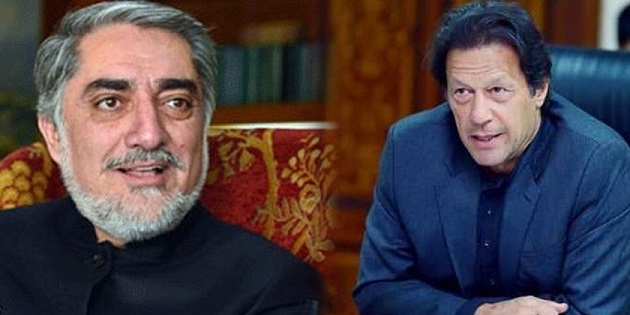Pakistan’s Prime Minister Imran Khan rang up the chairman of Afghan High Council for National Reconciliation, Dr Abdullah Abdullah this week. It was to invite the Afghan politician “to visit Pakistan at the earliest to share perspectives on advancing the Afghan peace process and forging closer ties between the two countries.”
Those who know of this region could be a little startled since Dr. Abdullah Abdullah was the losing presidential candidate in this year’s election which he claimed were rigged. Who would a loser be of interest to Pakistan?
Before we return to the subject, let’s first connect the dots of Pakistan’s foreign minister Shah Mahmood Qureshi who hours before was back from visiting China.
Afghanistan is extremely important for Pakistan, both for itself and also as a stooge of China which senses an opportunity in the region now that United States has packed up and literally left the mountainous country.
If China could’ve both Afghanistan and Pakistan to itself, it would be game-changer moment not just in Indian sub-continent but also in Middle East and Central Asia.
It’s this background in which one must look at the help Pakistan has extended in the US-Taliban deal. For it serves China’s purpose if US is out. The Inter-Services Intelligence (ISI), is known for its traditionally close ties with Afghan armed groups, including the Taliban, since the time of the former Soviet Union’s occupation of Afghanistan in the 1980s and has been instrumental in imparting them military training and in guerrilla warfare.
The call followed a meeting between Foreign Minister Shah Mehmood Qureshi and a Taliban delegation from their Qatar-based political office led by Mullah Baradar, the deputy chief of insurgents dealing with political affairs, at the Foreign Office this week.
Qureshi warned against the spoilers of the negotiations, a clear indication towards India.
India has military, strategic, economic interests in Afghanistan and US leaving the country would slip the power to Taliban, beholden to Pakistan.
For its part, the U.S. has already reduced its forces in Afghanistan to about 8,600 since signing the deal with the Taliban.
President Donald Trump has already said that the number of American troops would be cut to “between 4,000 and 5,000” by the November U.S. presidential election.
Washington has committed itself to pull out all U.S. forces from the country by mid-2021 in return for assurances the Taliban will prevent the use of Afghan soil for international terrorism and successfully negotiate a deal with rival Afghan factions.
Well, believing their assurances at our own peril! More so since Pakistan wants a “friendly” face in Kabul and not Ashraf Ghani who is well-disposed towards India.
One of the stumbling blocks is negotiations on release of prisoners.
The impasse over the issue of release of prisoners under an agreement signed by the US and Taliban is still unresolved. The Afghan government was to release 5,000 Taliban militants in exchange for its 1,000 Afghan security forces personnel held by the insurgents under an agreement signed by the US and Taliban in February.
The Afghan government is, however, reluctant to release the remaining 320 Taliban prisoners despite an approval by the Loya Jirga, the tribal Council in Afghanistan and a subsequent presidential decree ordering their release. The latest demand of the Afghan government is that Taliban set free 22 more Afghan commandoes in their captivity.
This whole drama of ‘release of prisoners’ was enacted by ISI and Pakistan establishment with almost same script in 1999 when they brokered the release of terrorist Azhar Masood and others.
The things are crystal clear. The so–called peace talks with Pakistan as a mediator is nothing but an attempt to release Taliban prisoners so that the present Afghan government can be weakened with that force unleashed.
For all practical purposes, Talibans control Afghanistan. The elected government’s writ doesn’t run beyond Kabul. This week, Taliban overrun several villages in Markazi district of Baghlan province and killed 10 armed men, related to rivals Hezb-e-Islami.
On August 25th, Taliban insurgents carried out a suicide bombing and other attacks against government security installations in Mazar-e-Sharif, Afghanistan, killing up to 20 people and injuring dozens others.
There have been attack on Kabul airport, military locations, on Afghan soldiers and defence personnel since the US-Taliban peace pact.
The talks on release and exchange of prisoners could not make headway though it were originally planned to begin from March 10 under an agreement between Taliban and US signed in Doha in February. Much of it was due to bad blood between Kabul and the insurgents which held up prisoners’ exchange—a condition for the dialogue.


